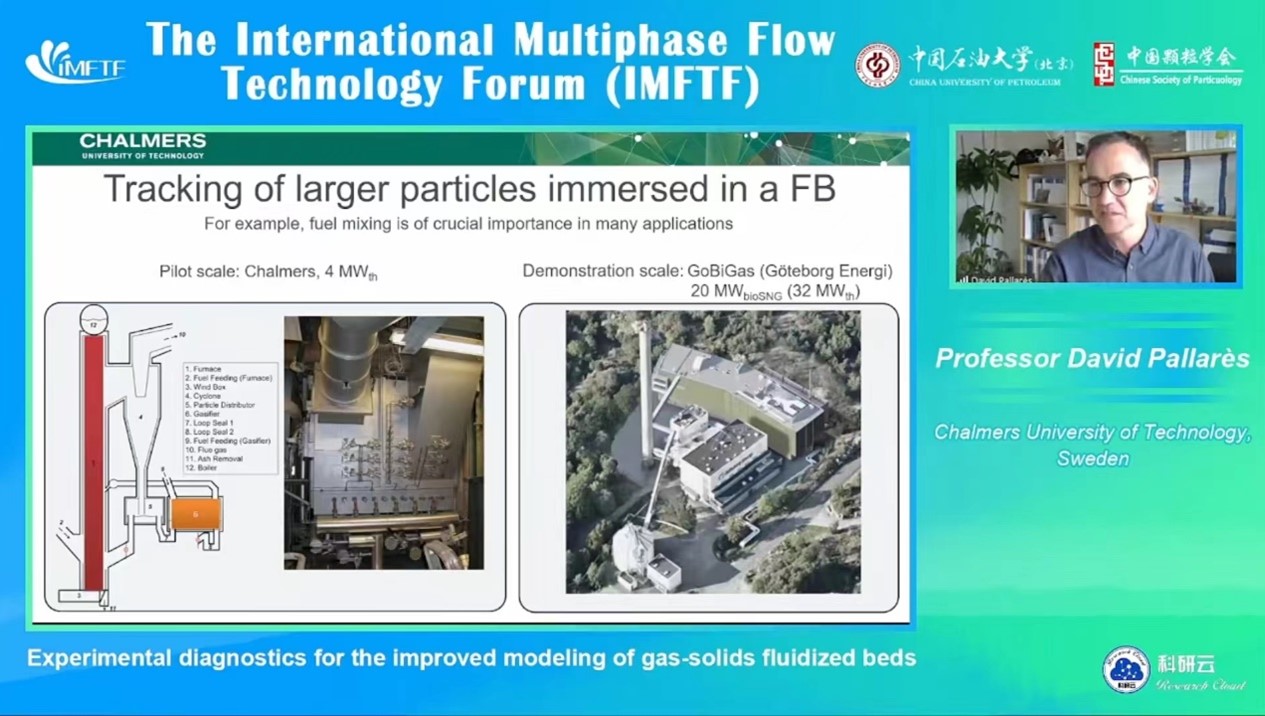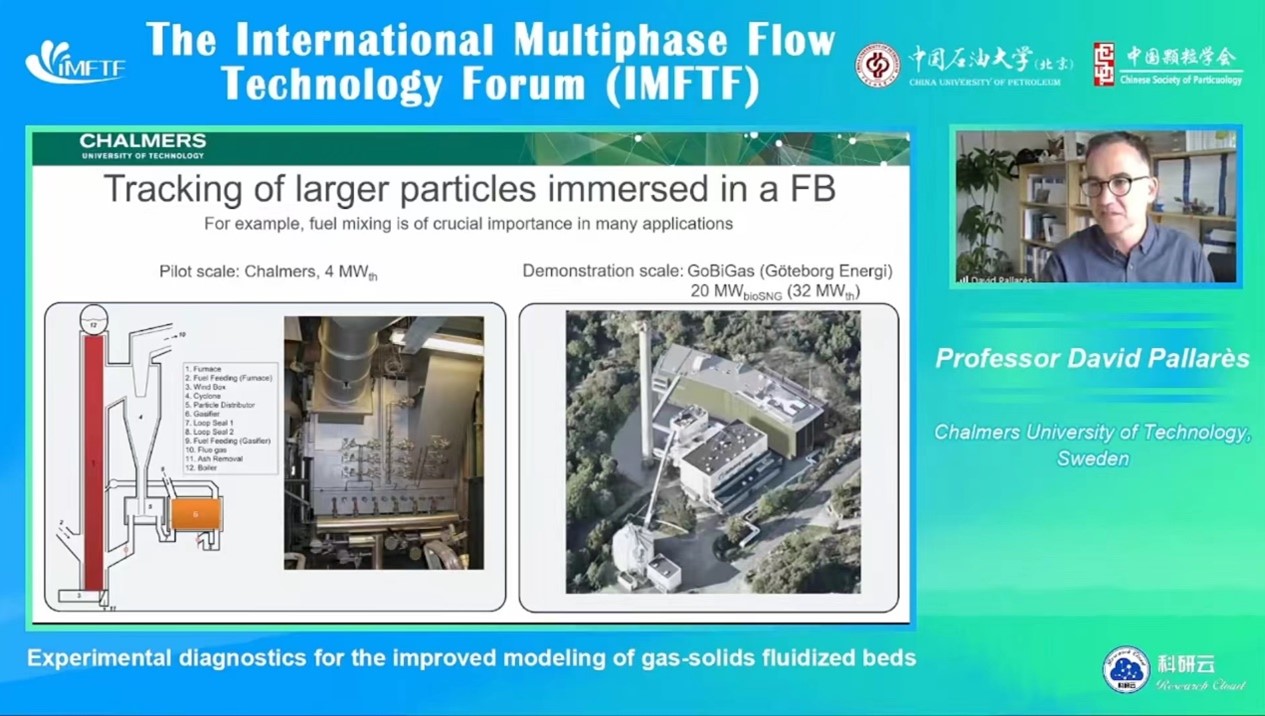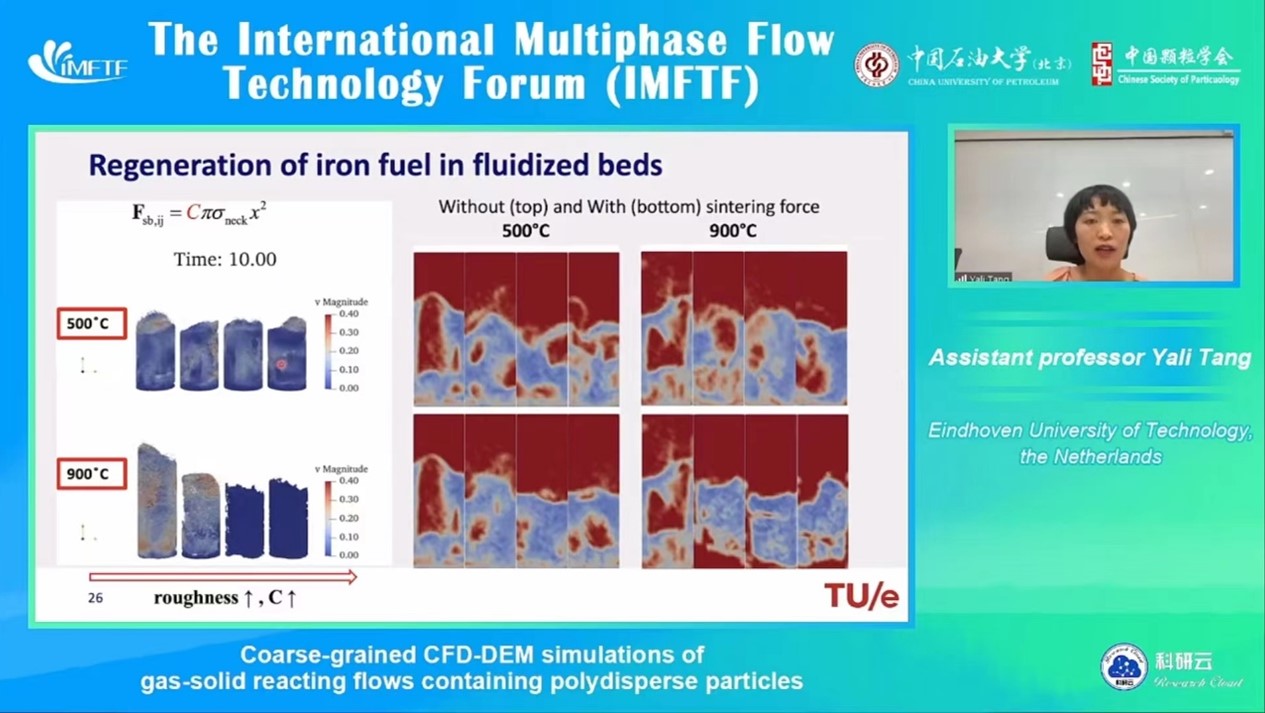国际多相流技术论坛(IMFTF) 举行第20次主题报告
发布时间:2023年7月5日 来源:中国颗粒学会

北京时间2023年6月30日19:00,由国际多相流技术论坛(IMFTF)、中国石油大学(北京)以及中国颗粒学会联合举办了第20次学术交流活动。活动邀请了瑞典查尔姆斯理工大学David Pallarès教授,荷兰埃因霍温理工大学Yali Tang助理教授两位学者。两位专家总结多年的研究成果,分别做了题为“气固流化床模型改进的实验验证”和“含多分散颗粒气固反应流粗粒度CFD-DEM模拟”的学术报告。
David Pallarès教授于2008年获得查尔姆斯理工大学博士学位,长期致力于流化床技术在推动可持续发展和减缓气候变化的能量转换过程中应用的研究。他的工作将流化床模型的开发和验证与实验研究相结合,研究集中在流体力学专用的高级测量技术研发。Yali Tang助理教授于2015年在埃因霍温理工大学获得博士学位,2017年起在埃因霍温理工大学机械工程系动力与流量组担任助理教授。Yali Tang助理教授的研究专长集中在用计算流体动力学建模方法上,所负责的一个重要课题是流体-颗粒系统以及气泡塔反应器中的流体力学、传质和传热。
此次报告会由中国石油大学(北京)姚军教授主持。由科研云平台提供技术支持,在中国颗粒学会微信视频号,B站,微博,Youtube等各大媒体平台同步直播,累计3.1万多人实时在线参与。
David Pallarès教授针对鼓泡流化床的应用背景,从流化床单元的建模、流体动力学测量以及先进的实验测试技术三个角度进行介绍。David Pallarès教授首先分析了流化床建模的三种方法,分析提出CFD方法计算量大的缺陷,并对半经验方法动量守恒计算提出质疑。接着提出了简化的气固两相流无量纲测量方法。最后介绍了大颗粒追踪、相机+数字图像分析以及雷达测量技术等流化床多相流测试技术,并引起与会学者专家的热烈讨论。

之后Yali Tang助理教授进行了粗粒度气固反应流模拟的汇报。对于工业多相流中的多尺度本质,非球形颗粒以及复杂反应等问题。Yali Tang助理教授提出了CFD-DEM的计算方法,采用粗颗粒、依赖颗粒尺寸的平滑方案进行模拟研究,并考虑了多相流中反应的计算。紧接着Yali Tang助理教授对工业中常见的CRIEPI燃烧器,炼铁高炉,流化床等多相流应用场合,进行了CFD-DEM应用的介绍。精彩的报告内容,引起了与会学者的热烈讨论,增近了国内外专家学者的学术交流。

会议在Yali Tang助理教授细致耐心回答中走向尾声。整场报告持续近两个小时,最后会议主持姚军教授代表组织方表达了对两位教授精彩报告的感谢。
国际多相流技术论坛于2020年1月10日成立。截至目前,IMFTF委员会成员来自于世界7个国家13所著名大学。该论坛旨在集中世界范围内多相流领域专家共同探讨工业领域中多相流技术的发展,面对技术难题共同进行科学攻关,为青年学者明确未来多相流技术发展方向。此类学术交流活动已经举办20余场,邀请了数十位国际权威学者进行了学术报告。
At 19:00 on June 30, 2023, Beijing time, the 20th academic exchange activity was jointly held by the International Multiphase Flow Technology Forum (IMFTF), the Chinese Society of Particuology and China University of Petroleum (Beijing). This event invited Professor David Pallares from Chalmers University of Technology in Sweden and Assistant Professor Yali Tang from Eindhoven University of Technology in the Netherlands. Two experts summarized years of research results and made academic reports entitled "Experimental diagnostics for the improved modeling of gas-solids fluidized beds" and "Coarse-grained CFD-DEM simulation of gas-solid reaction flows containing polydisperse particles" respectively.
Professor David Pallares received his PhD from Chalmers University of Technology in 2008, and has long worked on the application of fluidized bed technology in energy conversion processes to drive sustainable development and mitigate climate change. His work combines the development and validation of fluidized bed models with experimental research focused on the development of advanced measurement techniques specific to fluid mechanics. Assistant Professor Yali Tang received her PhD at Eindhoven University of Technology in 2015 and has been working as an Assistant Professor in the Power and Flow Group of the Department of Mechanical Engineering at Eindhoven University of Technology since 2017. Assistant Professor Tang's research expertise focuses on modeling methods using computational fluid dynamics, with an important topic in fluid mechanics, mass and heat transfer in fluid-particle systems and bubble tower reactors.
The report was chaired by Professor Yao Jun of China University of Petroleum (Beijing). Technical support is provided by the Scientific Research Cloud platform. It was broadcast live simultaneously on WeChat video account, Bilibili station, Weibo, and other major media platforms of the Chinese Society of Granular Science. The wonderful reports attracted a total of more than 26,000 professional viewers participating online in real time.

After a brief greeting, Professor Yao first introduced Professor David Pallares and invited him to make a presentation. In view of the application background of bubbling fluidized beds, Professor David Pallares introduced the modeling of fluidized bed units, fluid dynamics scaling, and advanced experimental testing techniques. Professor David Pallares first analyzed three methods for modeling fluidized beds, analyzed and pointed out the shortcomings of the CFD method, and questioned the momentum conservation calculation of the semi-empirical method. Then a simplified dimensionless scaling method for gas-solid two-phase flows is proposed. At last, the techniques of measuring multiphase flow in fluidized bed, such as large particle tracking, camera probe+ digital image analysis and radar technology, were introduced. The report aroused heated discussions among scholars and experts at the meeting.

Then Assistant Professor Yali Tang gave a presentation on coarse-grained gas-solid reaction flow simulation. For multi-scale nature, non-spherical particles and complex reactions in industrial multiphase flows. Assistant Professor Yali Tang proposed the computational method of CFD-DEM, using coarse particle, particle size dependent smoothing scheme for simulation studies, and taking into account the calculation of reactions in multiphase flows. Then Assistant Professor Yali Tang introduced the application of CFD-DEM to the multi-phase flow applications such as CRIEPI burners, blast furnace and fluidized bed, which are common in industry. The wonderful content of the report aroused a heated discussion among the participating scholars, and increased the academic exchanges between domestic and foreign experts and scholars.
The meeting came to an end when Associate Professor Yali Tang answered the questions meticulously and patiently. The whole report lasted for nearly two hours. Finally, Prof. Yao Jun, the host of the meeting, expressed his gratitude to the two professors on behalf of the organizers for their wonderful reports.
The International Multiphase Flow Technology Forum (IMFTF) was established on January 10, 2020. Up to now, IMFTF committee members come from 13 famous universities in 7 countries around the world. The forum aims to gather experts in the field of multiphase flow from all over the world to discuss the development of multiphase flow technology in the industrial field, to jointly carry out scientific research in the face of technical problems, and to clarify the future development direction of multiphase flow technology for young scholars. More than twenty such academic exchange activities have been held, and dozens of international authoritative scholars have been invited to give academic reports.



 京公网安备11010802033820 号
京公网安备11010802033820 号